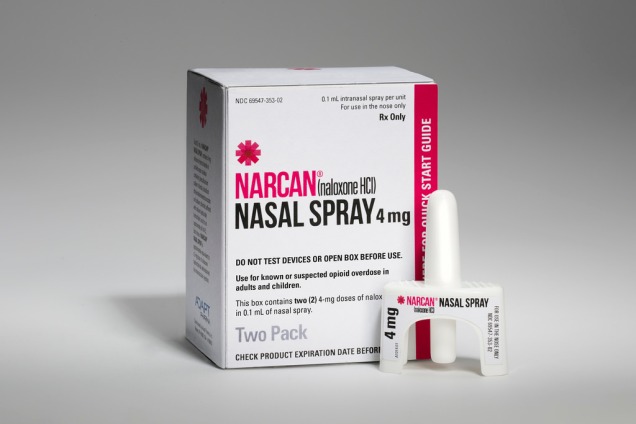(Content warning: image of drug paraphernalia and mention of opioid overdose.)
In my research on how libraries promote health and wellness in their communities, I’ve encountered numerous stories about how libraries have become involved in combating the opioid crisis by offering training opportunities to staff in administering Narcan (a.k.a. naloxone), a drug that reverses the effects of opioid overdoses.
Yes, I’ve read a lot of stories on this topic. A lot.
Like this one from American Libraries.
And this one from the New York Times.
And this one from the Times Union in Albany.
And this one from Public Libraries Online.
And this one.
And this one.
In fact, the intersection of the opioid crisis and libraries has become so urgent that the Institute of Museum and Library Services (IMLS) has recently awarded a nearly $250,000 grant to OCLC, a global library cooperative based in Ohio, to help libraries and their partners respond to the opioid epidemic.
When I picture myself as a future librarian, I see myself answering reference questions, organizing community events, collaborating with other local organizations, and even doing more mundane tasks like preparing budgets or writing grants. I’m getting into the library profession because of my desire to serve the needs of the community, and I don’t think that everything is going to be sunshine and rainbows. I don’t imagine a sedate 9-5 job in hallowed hall of books. I am mentally prepared — ready and willing, in fact — to encounter issues relating to homelessness, poverty, and other difficult life circumstances that patrons may encounter.

But there’s something about the thought of dealing with opioid overdoses that kind-of terrifies me, and I’m not quite sure why. Maybe because it’s a life-or-death situation and “librarian” does not strike me as the sort of profession that deals in life-or-death situations. Maybe it’s because I’m inexperienced in dealing with drug-related issues. (I once helped someone locate a Narcotics Anonymous meeting and contact a rehab facility, but that’s the extend of my experience.) I’m usually pretty calm in a crisis, but I’ve never encountered a crisis involving an overdose before.
For whatever reason, the thought of future me having to administer naloxone (especially via injection) to an overdosing patron is nerve-wracking. This is not something you’re prepared for in library school. What if I do it wrong? What if I make a mistake and the person isn’t really overdosing, but something else is the matter? What if…?
After taking a deep breath, I managed to locate some reasons why I should be less worried:
- According to this article, “If Narcan is given to someone who is not experiencing overdose, nothing will happen; there is no potential for harm.” That’s reassuring, because I would never want to hurt someone while trying to help them.
- Naloxone is available as a nasal spray, not just as an injection. Nasal sprays seem safer and more manageable to me.
- Training is available to learn how to assess the signs of opioid overdose and to administer naloxone. No one would expect me to do it without training.
- In fact, the Central New York Library Resources Council (CLRC) offered a Narcan training workshop for librarians in December, and I expect they will do so again.

In spite of my apprehension, and perhaps as a way to combat it, I do intend to pursue training in this area since, according to all the articles and news stories I’ve read, it’s something I may very well encounter as a library professional. In fact, a pharmaceutical company recently announced it would supply two free doses of Narcan to every public library in the U.S. so the chances are good that I will someday work at a library where Narcan training will be essential. (It would probably also be a good idea for me to get certified in First Aid, CPR, and the use of an AED, too. Patron emergencies are by no means limited to opioid overdoses.)
I truly believe that libraries and librarians can change lives, and I hope, by the time I become a librarian, I will feel more confident and capable of dealing with this particular kind of challenge. I’d like to think I will be ready to help save a life if need be.

There have been two librarians I’ve worked with whose email signatures said, “If I wanted to help people I wouldn’t have become a cataloger.” And yet cataloging may be completely behind the scenes but it’s still helping people, helping them find information. Information is going to be a big part of overcoming the opioid crisis. In the meantime, though, I’m glad there’ll be librarians like you helping with more than just information.
LikeLiked by 1 person
The Toronto Public Library hired its first full-time social worker last fall to work with the homeless, who are heavy users of the city’s libraries. Many libraries also volunteer to become warming centres for the homeless when the temperature is dangerously low, so librarians definitely are life-savers!
LikeLike
I am finding this out myself. Not related to the opioid crisis but things related to homelessness, drug abuse and general overwork of the students of the academic library I work at. When I tell people that I want to go into librarianship and that it is definitely not about stamping books, they look at me with pity – they think I’m lying. But like any public-facing job, it comes with the human aspect – the management of that aspect as well as its beauties and it ugliness.
Stay strong, librarians are guardians in all sorts of ways and most of them seem unrecognisable when you think of the stereotype.
LikeLiked by 1 person